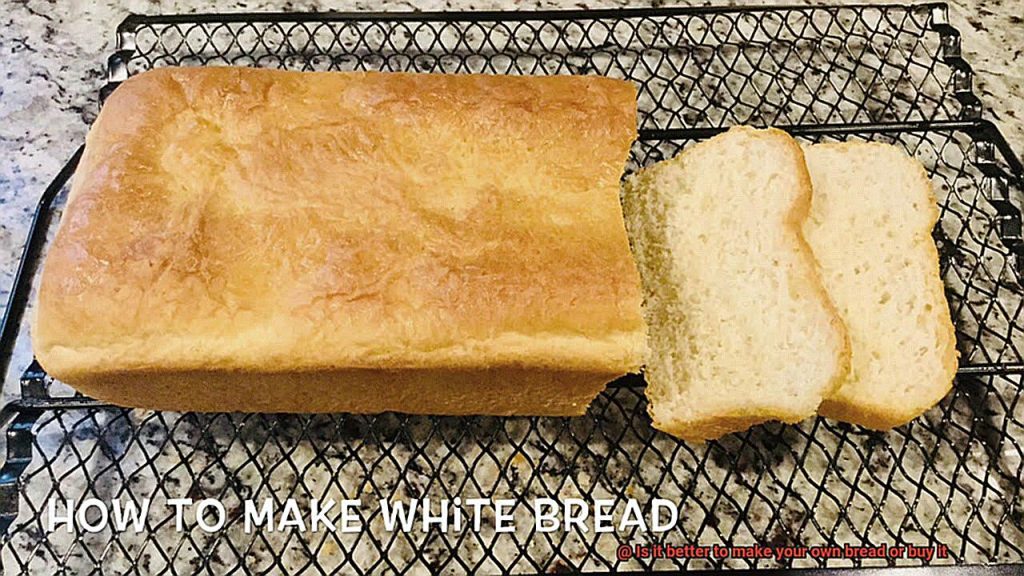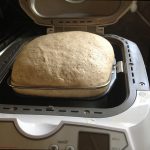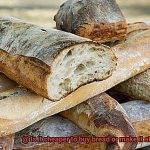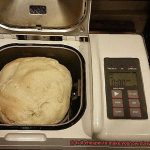Bread, the age-old staple food, has been a part of human diet for centuries.
It’s versatile and can be enjoyed in many ways – from crunchy toast to fluffy sandwiches and even as a decadent bread pudding. But the question that lingers on every bread lover’s mind is whether to make their own or buy it from the store?
The decision comes down to factors like time, money, and quality. In this blog post, we’ll explore the pros and cons of both options.
We’ll dive into the financial costs of each choice, the health benefits of homemade bread, convenience factor, and how you can decide which option works best for you. Whether you’re an experienced baker or someone looking for a healthy yet scrumptious option, this post will help you make an informed decision about making vs buying bread.
So sit back, relax and get ready to learn more about this dilemma.
Contents
The Taste of Homemade Bread vs Store-Bought Bread
There’s something special about the taste that can’t be replicated by store-bought bread. But is the effort worth it? Let’s explore the taste differences between homemade and store-bought bread.
Homemade bread offers a unique flavor experience that can’t be found in store-bought bread. With high-quality ingredients, bakers can create a richer and more complex taste. Plus, the ability to experiment with different ingredients and flavors allows for endless customization options.
On the other hand, store-bought bread often has a consistent, but sometimes bland taste due to standardized recipes and ingredients. Additionally, preservatives may affect the flavor and texture of the bread.
However, making homemade bread requires time and effort, which may not be feasible for everyone. Even experienced bakers may encounter issues with dense or undercooked loaves. Store-bought bread offers convenience for those with busy schedules or limited kitchen space.
But let’s not forget about freshness. Homemade bread is freshly baked, resulting in a crispy crust and soft interior that can’t be replicated by store-bought bread. Plus, without added preservatives, homemade bread is healthier and better for you.
Ultimately, the decision to make your own bread or buy it from a store comes down to personal preferences and priorities. If you value flavor, nutrition, and the satisfaction of creating something yourself, then making your own bread is worth the effort. However, if convenience and affordability are your top priorities, then buying bread from a store may be more practical.
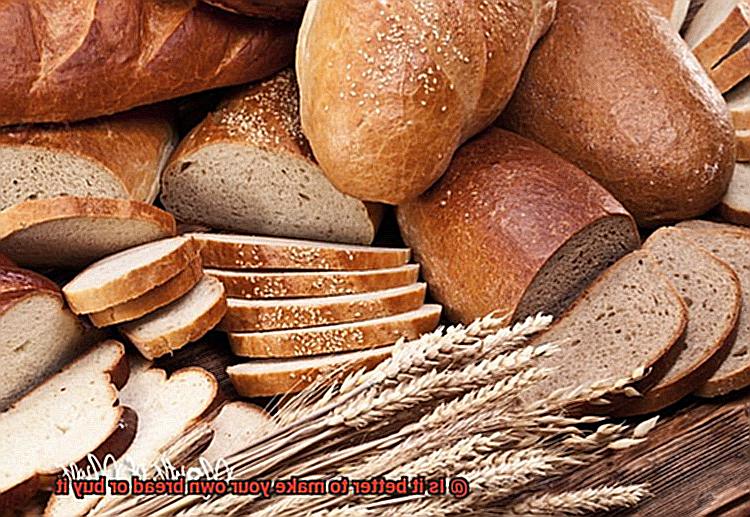
Cost Comparison: Homemade vs Store-Bought Bread
When it comes to bread, one of the main factors to consider is the cost. Store-bought bread can be convenient, but the price can vary depending on where you live and what type of bread you prefer. On average, a loaf of bread can cost anywhere from $2 to $If you eat a lot of bread, this cost can add up quickly.
On the other hand, making your own bread at home can be time-consuming, but it can also save you money in the long run. The initial cost of buying ingredients and equipment may be higher than buying a single loaf of bread, but the cost per loaf decreases over time. For example, a bag of flour and a package of yeast can make multiple loaves of bread, saving you money in the long run.
Moreover, making your own bread at home gives you control over the quality of ingredients. You can choose to use organic flour or add in extra grains and seeds for added nutrition. This means that you can create a healthier and more satisfying loaf of bread that meets your taste preferences.
In addition to the cost savings and health benefits, making your own bread at home is also a fun and rewarding experience. You get to experiment with different recipes and techniques to find what works best for you. And let’s not forget the satisfaction of slicing into a warm, freshly baked loaf of bread that you made yourself.
So why not give homemade bread a try? It may take some time and effort, but the benefits are worth it. Not only will you save money in the long run, but you’ll also enjoy a high-quality and customizable product that can’t be replicated by store-bought bread.
Health Benefits of Making Your Own Bread
Bread is a staple food that has been enjoyed by many cultures for centuries. The aroma of freshly baked bread filling the home is hard to resist. But did you know that making your own bread can have numerous health benefits? As an expert on this topic, I’ve compiled some research notes to explain the health benefits of making your own bread.
Firstly, when you make your own bread, you have complete control over the ingredients that go into it. This means that you can use high-quality flour, organic yeast, and incorporate healthy ingredients such as seeds, nuts, and whole grains. On the other hand, store-bought bread often contains additives, preservatives, and high levels of sodium that can be detrimental to your health. By making your own bread, you are avoiding these harmful ingredients and ensuring that you are consuming only wholesome and nutritious ingredients.
Moreover, customizing your bread according to your dietary needs is another major advantage of making your own bread. For instance, if you are gluten intolerant or have celiac disease, you can use gluten-free flour alternatives such as almond or coconut flour to make your bread. Similarly, if you are trying to reduce your carbohydrate intake, you can opt for low-carb flour alternatives like almond or coconut flour. By making these small adjustments to your bread recipe, you are able to cater to your specific dietary needs without compromising on taste.
In addition to these benefits, making your own bread is an excellent way to incorporate more fiber into your diet. Whole-grain flour contains more fiber than white flour which can aid digestion and keep you feeling fuller for longer periods of time. Fiber also helps regulate blood sugar levels and reduces the risk of chronic diseases such as heart disease and diabetes. By making your own bread with whole grain flour, you are increasing your fiber intake and reaping the health benefits that come with it.
Last but not least, making your own bread can be a therapeutic activity that helps reduce stress levels. Kneading dough can be a relaxing and meditative process that provides a sense of accomplishment once the bread is baked. Moreover, baking bread at home creates a warm and inviting atmosphere that can bring families together. The act of making bread from scratch can be a bonding experience that brings joy and relaxation to the entire household.
Drawbacks of Making Your Own Bread
Making your own bread may seem like a fantastic idea at first, but there are some drawbacks to consider before you embark on this journey. Despite the satisfaction of creating something from scratch, it’s important to be aware of these potential downsides.
Firstly, making your own bread requires time and effort. It can be a long and messy process that requires multiple steps and equipment such as a mixer, dough hook, and bread pans. This can be especially daunting for those who have busy schedules or limited kitchen space. Plus, who wants to spend hours kneading dough when you could be doing something else?
Secondly, making your own bread may not be as cost-effective as you think. Although homemade bread may seem like a cheaper alternative to store-bought bread, the cost of ingredients such as flour, yeast, and sugar can add up quickly. This is especially true if you experiment with different types of bread. Additionally, homemade bread may not last as long as store-bought bread, so you might end up wasting ingredients and money if the bread goes stale.
Thirdly, making your own bread does not always result in a perfect loaf. Even experienced bakers can run into issues with things like rising time, temperature, and moisture content, which can affect the texture and taste of the final product. This can be frustrating for those who are new to bread-making or who are looking for consistent results.
Despite these drawbacks, many people still prefer to make their own bread for various reasons. Some do it for the satisfaction of creating something from scratch or for dietary reasons such as avoiding preservatives or gluten. However, it’s essential to be realistic about the potential challenges involved.
To summarize, here are some things to keep in mind before making your own bread:
- Bread-making is a time-consuming process that requires effort and equipment.
- The cost of ingredients can add up quickly, especially if you experiment with different types of bread.
- Homemade bread may not last as long as store-bought bread, so you might end up wasting ingredients and money if the bread goes stale.
- Even experienced bakers can run into issues with rising time, temperature, and moisture content, which can affect the texture and taste of the final product.
Time and Effort Required for Homemade Bread
Well, be prepared for a bit more effort and time. But let me tell you, as an expert on this topic, that the result will be worth every second and every ounce of energy.
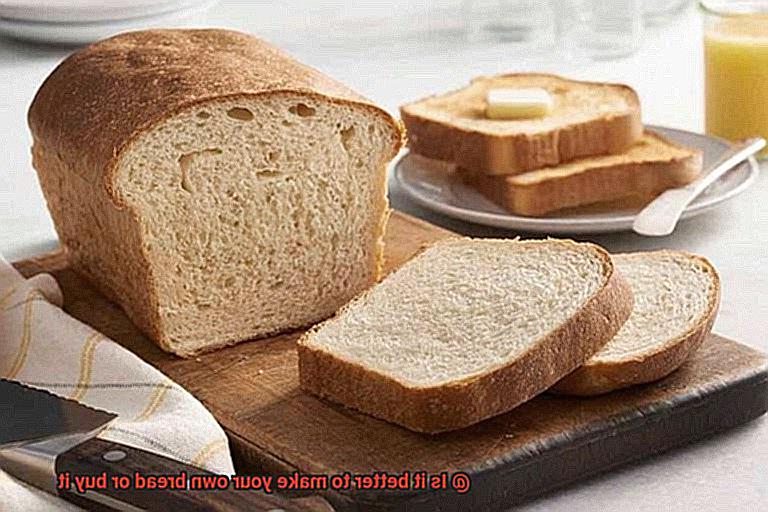
To make bread at home, you will need to set aside several hours for mixing, kneading, rising, and baking. This may seem like a daunting task, but it can also be a therapeutic and enjoyable activity to do with family or friends. Plus, you get to customize every aspect of the bread-making process to suit your preferences.
From choosing the type of flour to adding seeds or herbs, making homemade bread gives you endless opportunities to experiment with different ingredients. You can even adjust the salt and sugar content to create a healthier version of your favorite bread. This level of control over your food is something that many people find rewarding.
However, let’s not forget that making bread at home can be messy and time-consuming. Flour flying everywhere can be quite common if you’re not careful. And there’s definitely a learning curve when it comes to baking bread, so don’t expect your first loaf to be perfect. But with some practice and patience, you’ll soon become an expert in no time.
Ultimately, whether making homemade bread is right for you depends on your personal preferences and lifestyle. If you prefer convenience and quick meals, then buying bread from the store may be a better option. But if you enjoy cooking and have the time and patience to devote to making bread from scratch, then it may be a worthwhile endeavor.
Kitchen Space Considerations for Homemade Bread
Before you start kneading away, it’s important to consider the kitchen space you have available. Making bread from scratch can be a messy and time-consuming process that requires a fair amount of counter space. But fear not, as an expert on this topic, I’ve compiled some research notes to help you make the most out of your kitchen space when making homemade bread.
Counter Space:
Let’s start with the obvious – counter space. You’ll need enough room to comfortably knead the dough and store any necessary equipment such as mixing bowls, measuring cups, and baking pans. If you have a small kitchen, don’t worry; there are ways to work around this limitation. Consider investing in a stand mixer with a dough hook attachment that can help you knead the dough without taking up too much space. You could also try making smaller loaves or using a bread machine that does most of the work for you.
Storage Space:
Next up is storage space for ingredients and finished products. Homemade bread typically requires several ingredients such as flour, yeast, salt, and sugar. It’s important to make sure you have enough pantry or cabinet space to store these items safely and securely. To keep your finished product fresh for as long as possible, find a place to store it that’s cool, dry, and away from any potential contaminants.
Organization:
Keeping your kitchen organized is key when making homemade bread. Keep all your bread-making supplies in one designated area to avoid clutter and confusion. Label your ingredients and keep them in clear containers for easy access and quick inventory checks before starting on a new loaf.
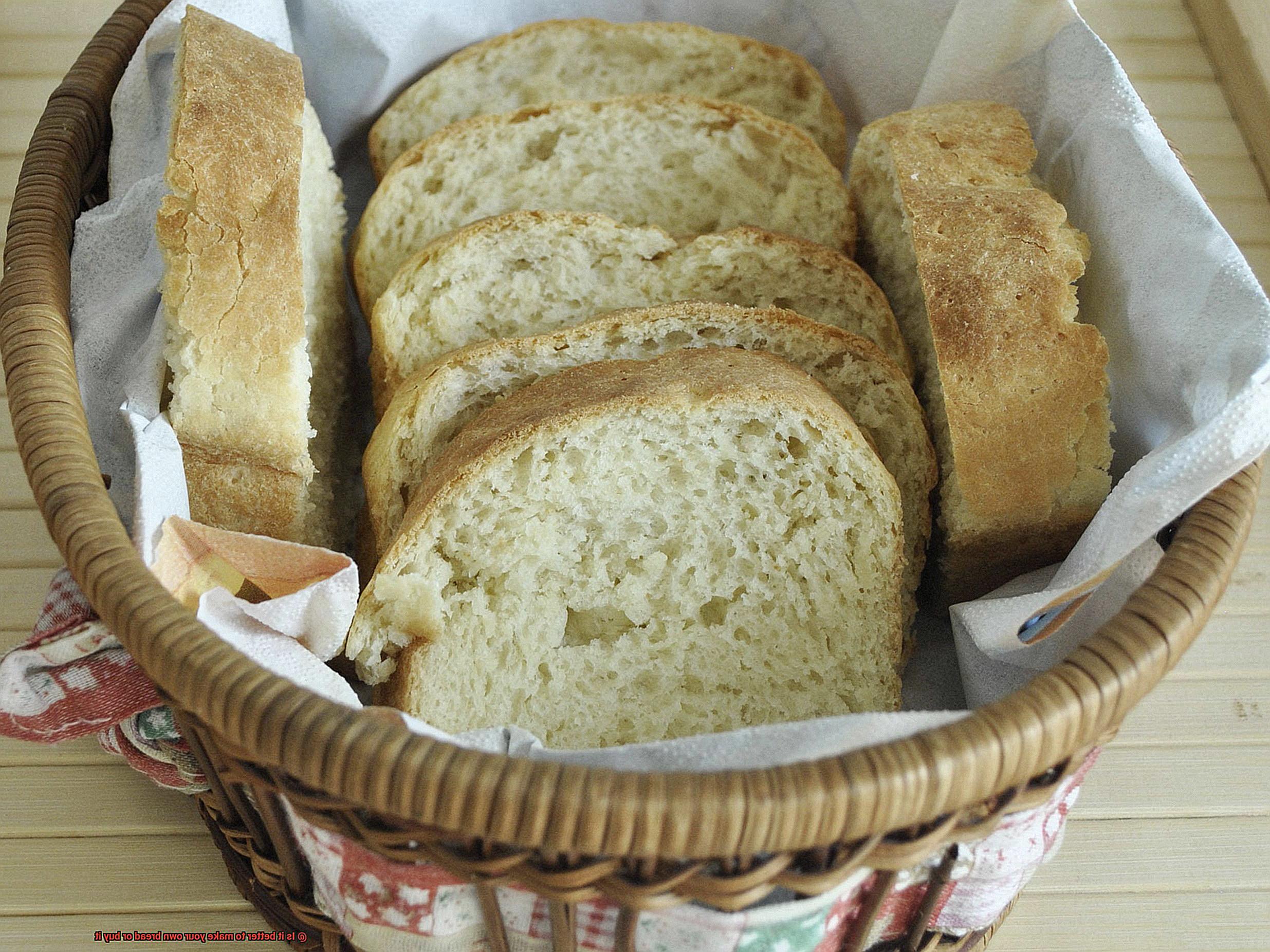
How to Overcome Challenges When Baking Homemade Bread
Baking homemade bread can be a gratifying and fulfilling experience, but it can also be daunting, especially for beginners. However, with a little bit of patience and perseverance, these challenges can be overcome, and you can enjoy the taste of fresh bread anytime you want. Here are five sub-sections explaining how to overcome the challenges of baking homemade bread.
Achieving the Perfect Rise
The perfect rise is crucial to achieve that fluffy texture we all love in homemade bread. To overcome this challenge, use fresh yeast, ensure the bread dough is mixed and kneaded thoroughly, and let it rise in a warm, draft-free place until it has doubled in size. Over-kneading can lead to tough texture and hinder the rise.
Creating a Crispy Crust
Achieving a crispy crust without drying out the bread inside is another common challenge when baking homemade bread. To tackle this issue, brush the dough with water before baking, and ensure that the oven is at the right temperature. A steam bath in the oven can also help create a crispy crust.
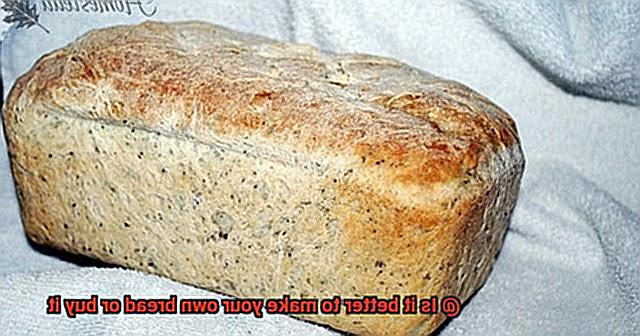
Ensuring Proper Cooking
It’s essential to make sure that your bread is cooked through without burning it. To avoid this problem, use an oven thermometer to ensure that the oven temperature is accurate. Also, check the internal temperature of the bread with a thermometer before removing it from the oven – it should be around 190-200°F.
Storing Homemade Bread
Storing homemade bread can be tricky as it tends to stale faster than store-bought bread. To keep your homemade bread fresh, wrap it in foil or plastic wrap and store it at room temperature for up to three days or freeze it for longer storage.
Achieving Desired Texture and Flavor

Getting the desired texture and flavor can be another challenge when baking homemade bread. To overcome this challenge, follow a recipe closely and pay attention to details such as mixing times and ingredient measurements. Experimenting with different types of flour or adding in various ingredients such as herbs or cheese can also help add flavor and texture to your homemade bread.
What to Consider Before Deciding Whether to Make or Buy Bread
When it comes to making or buying bread, there are numerous factors to consider. Each person has individual priorities and preferences that should be taken into account. Here are 5 sub-sections of important factors to consider before deciding whether to make or buy bread:
Convenience
Convenience is a crucial factor to take into account when deciding whether to make or buy bread. If you have a busy schedule and don’t have the time or energy to bake bread, buying it may be the best option for you. On the other hand, if you enjoy baking and find it relaxing, making your own bread can be a rewarding experience.
Cost
The cost of making bread versus buying it is another important factor to consider. While making your own bread may seem cheaper at first, it’s important to consider the cost of ingredients and equipment in the long run. If you don’t bake often, investing in expensive equipment such as a bread maker or stand mixer may not be worth it. In this case, buying bread from a store or bakery may be more cost-effective.
Nutritional Value
The nutritional value of the bread is also a significant factor to consider. Homemade bread allows you to control the ingredients that go into it, resulting in a healthier product. Store-bought bread often contains preservatives and artificial ingredients that may not be as healthy. However, it’s crucial to choose high-quality ingredients and follow a balanced recipe for homemade bread to ensure its nutritional value.
Taste and Texture
Taste and texture are essential factors to consider when deciding whether to make or buy bread. Homemade bread allows for customization – you can adjust the ingredients to create a unique flavor profile or texture that suits your liking. Store-bought bread may be more predictable in terms of taste and texture, but it may not have the same homemade touch.
Personal Preference and Lifestyle
Lastly, personal preference and lifestyle should also be taken into consideration. Some people may find the process of baking bread to be therapeutic and satisfying, while others may prefer the convenience of buying pre-made bread from a store. It’s essential to choose the option that aligns with your lifestyle and preferences.
Conclusion
In conclusion, the age-old debate of whether to make your own bread or buy it from a store ultimately boils down to personal preferences and priorities. Homemade bread certainly has its perks, including the freedom to customize ingredients and flavors, complete control over nutritional value, and long-term cost savings. However, it’s important to acknowledge that making bread from scratch requires time, effort, and ample kitchen space.
On the flip side, purchasing bread from a store offers convenience and consistency but may come with added preservatives and artificial ingredients that can be harmful to health. It’s a tradeoff between convenience and quality.
When deciding whether to make or buy bread, it’s crucial to consider factors such as convenience, cost, nutritional value, taste and texture preferences, and personal lifestyle. Ultimately you need an option that aligns with your priorities.
If you’re an avid baker who enjoys spending time in the kitchen and has the patience for the process of making bread from scratch then go for it. There’s nothing like sinking your teeth into a warm slice of homemade bread fresh out of the oven. However, if convenience is king for you then buying bread from a store is more practical.
No matter what choice you make, remember that there’s nothing quite like the smell of freshly baked bread wafting through your home.

